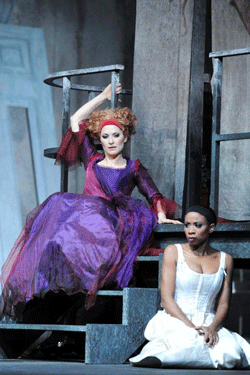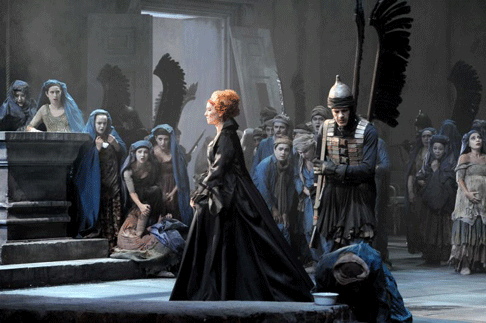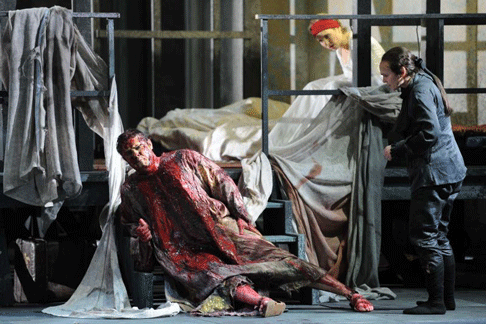Perhaps the most astounding hallmark of this fine production is the fact that the stellar cast was assembled from Essen’s own roster of house singers. Many an international company would count itself lucky to have fielded such a superior team of soloists. First among equals was the commanding Hercules from Almas Svilpa. That his sonorous, resounding Heldenbariton also serves him well when he takes on Wotan at the house is no surprise. Even more awesome than his burnished tone, however, was Mr. Svilpa’s bravura technique that allowed the role’s florid vocal fireworks to come hurtling into the auditorium with utmost precision and emotional heft. I have seldom heard such interpretive freedom and nuance in a voice so large. Almas is also a sincere and attentive actor with an imposing, well-defined body that commands the stage.
 Michaela Selinger as Dejanira and Christina Clark as Iole
Michaela Selinger as Dejanira and Christina Clark as Iole
The many challenges of Dejanira’s vocal and theatrical machinations held no fear for Michaela Selinger’s lusciously appealing mezzo. Ms. Selinger brings a wealth of stage savvy to bear, and she coolly mines a wealth of variety from the moody, prodding, vengeful character. The role calls for wide-arching phrases, rapid-fire fioritura, sinuously persuasive pleas, self-righteous dramatic statements, and caressed introspections, and well, this diva divine simply has it all, plus a star quality that is every bit a match for her Hercules.
Diminutive, lovely Christina Clark as Iole is a perfect foil for Dejanira, with her beautifully schooled, crystal clear, silvery soprano that, though small, floats out into the house with ease. Ms. Clark’s voice may have an innate sweetness, but she can also suggest some starch and bite when the drama requires. She immerses herself into the role with abandon.
Andreas Hermann cut a handsome figure as Hyllus, and utilized his attractive, rather straight-toned tenor to good effect. His refined phrasing lent an underlying elegance to the tortured son’s ruminations. Marie-Helen Joel was a bright-voiced, prepossessing Lichas. Her lean, responsive mezzo and assured deportment rounded out the first-rate cast who worked beautifully singly and together. Speaking of which, Alexander Eberle’s hard-working, peripatetic chorus was another of the performance’s glories for their luxuriant ensemble singing and ardent dramatic involvement.
 Michaela Selingeras as Dejanira with Opern- und Extrachor, Statisterie des Aalto-Theater
Michaela Selingeras as Dejanira with Opern- und Extrachor, Statisterie des Aalto-Theater
Perhaps that was because Herr Eberle was indeed the evening’s conductor, and what a loving, incisive reading he coaxed from cast and pit! Maestro Eberle not only partnered his soloists with uncanny care and consideration, he also found an internal pace to the whole evening that would be the envy of many a Baroque “specialist.” Rarely, have I been so completely drawn into a Handel stage work. Eberle had his work cut out for him since the choral and instrumental forces were often spread out into the upper tier or offstage sides of the auditorium. Well worth it say I since this was a brilliant effect which surrounded us with, enveloped us into waves of music.
But this begins to fall into the realm of stage direction, and here, too, Essen scored a bull’s eye. Originally staged by Dietrich W. Hilsdorf and here remounted by Carolin Steffen-Maass, this was a fascinating “leap of faith.” For the production did not try to pretend that the oratorio format had a linear dramatic timeline. Not a Unity in sight, they elected to treat each new set piece as an impression that fits into the whole, perhaps like a piece of a stained glass window, or in stage terms, like the vignettes that form Webber and Rice’s Evita.
In making this choice, they went for broke and aggressively physicalized each scena. This yielded astounding results, and the no-holds-barred sparring and wrestling and clutching and chasing that informed many confrontations were raw, startling, and arresting. That is not to say there were not contrasting moments of repose and contemplation, but these were made all the more impressive in the context of such a primal frame of reference.
 Almas Svilpa as Hercules, Michaela Selinger as Dejanira and Marie-Helen Joel as Lichas
Almas Svilpa as Hercules, Michaela Selinger as Dejanira and Marie-Helen Joel as Lichas
Dieter Richter’s massive, decaying structure with its eroding stone walls, downstage cistern, displaced doors, and crumbing skylight evoked many locales, to include a temple, a public bath, a reception room, and (with addition of a large, curtained bed-room-platform stage left) a theatre. The front scrim cloth of Dejanira’s boudoir is adorned with what appears to be a primitive cave painting. So many productive uses then, for this evocative environment. It is gorgeously lit by Dirk Beck, whose brooding, mist-filled general wash was frequently invaded by beams of warm specials like that streaming from upper stage right’s large round embrasure.
Arguably the hardest-working designer was Renata Schmitzer who attired the large cast in over-the-top costumes that were varied, explicit, and staggering in aesthetic scope. In general the look seemed grounded in Handel’s own period, witness the elegant black mourning clothes, and the riotously colored waistcoats, gowns and wigs of the courtiers. The soldiers were truly intimidating with their black uniforms from a more biblical era, with breastplates and two huge feathered inverted “f’s” attached to the back as an ominous decoration that caused the men to tower over the female peasants (clad in burka variations).
The leading roles were tellingly attired in variations of shiny elegant underclothes (Iole), sleepwear (Dejanira, Hercules), court wear (Hyllus, Lichas) and uniform (Hercules). Dejanira’s volatile burgundy/purple, Hyllus’s icy blue, Lichas’s deep gray, Hercules’s bluish-grey, and Iole’s transition from white to black all meaningfully underscored their character’s souls.
If I had one wish, I would ask that the company work a bit on their English pronunciation. Only American Clark was singing in her native language and not surprisingly, her diction was superb. The others had moments of excellence, but with everything operating as such a superlative level, that was the one element that could be improved upon. Yes, I know the audience didn’t care since they were reading the German supertitles, but. . .just sayin.’
The choice to present Handel’s Hercules was a considerable risk. But thanks to Essen’s wholly winning artistic contributions it paid off with a success as colossal as its namesake.
James Sohre
image=http://www.operatoday.com/1614_2045_Hercules-0338.gif
image_description=Almas Svilpaas as Hercules and Marie-Helen Joel as Lichas [Photo by Thilo Beu courtesy of Aalto-Musiktheater]
product=yes
product_title=G. F. Handel: Hercules
product_by=Hercules: Almas Svilpa; Dejanira: Michaela Selinger; Hyllus: Andreas Hermann; Iole: Christina Clark; Lichas: Marie-Helen Joel; Conductor and Chorus Master: Alexander Eberle; Director: Dietrich W. Hilsdorf; Set Design: Dieter Richter; Costume Design: Renata Schmitzer; Lighting Design: Dirk Beck; Stage Director of the Revival: Carolin Steffen-Maass; Chorus Master: Alexander Eberle; Continuo Group: Natalia Spehl (Cembalo/Organ), Ulrich Mahr (Cello), Michael Giesen (Bass), Stephan Rath (Theorbo).
product_id=Above: Almas Svilpaas as Hercules and Marie-Helen Joel as Lichas
Photos by Thilo Beu courtesy of Aalto-Musiktheater